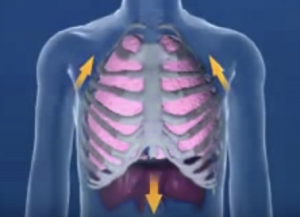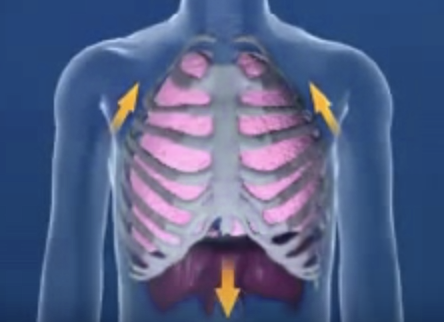The intercostal muscles are situated between the ribs and are made of many muscle groups like the transverse and subcostal thoracic muscles and the external and internal intercostal muscles. They assist in the movement and stabilization of the chest wall.
Intercostal muscle stain often occurs due to rapid trunk twisting which is a common feature in sports like tennis or basketball. Strain of the intercostal muscles is usually very painful. Since these muscles are located between the ribs in the chest which also houses the lungs, affected people may experience severe pain even when breathing. There are many causes to an intercostal muscle strain, including a broken rib. Hence, it is best to consult a doctor for diagnosis and relevant treatment.
Symptoms
Intercostal muscle strain can be mild or serious; it is often accompanied by the below listed signs and symptoms:
- Pain: Continuous and very severe pain in the chest area
- Sudden and unexpected intense pain of the muscles in the rib
- Chest wall pain, i.e., tenderness when ribs are pushed downwards or touched
- The pain tends to become more severe during twisting, motion, sneezing, or coughing
- The pain is often shooting, sharp, and extremely intense
- With mild intercostal strain, the pain tends to disappear on its own in a day or two
- Swelling: The area with injury tends to be swollen
- The ribs on the side of the trauma are swollen
- Hematoma, i.e., blood accumulation in swollen area, may be present
- Tenderness: Patients may not be able to wear tight tops or tight upper body apparels
- Bruising with pain
- Patients may experience pain when trying to sit or get out of a chair, or when turning over in bed
- Intercostal muscle strain tenderness is experienced just above the ribs and not within the chest
- Breathlessness: Breathing nearly always causes pain
- Increased sensations of tightness in muscles which may hamper sufficient intake of air
- Patients may take shallow breaths so as to avoid pain
- Tightness of the muscles: During swelling and pain, the chest wall muscles tend to feel tighter
- Increased difficulty in deep inhalation
- The injured area is typically the region with most severe tightness
- Intercostal muscle strain may pose difficulties in movements of the chest region and sometimes even of the upper limbs.

Causes of intercostal muscle strain
The ribcage area is home eleven different kinds of muscle groups. The intercostal region features three different muscle layers which are connected to the ribs. They can stretch quite a bit and thus facilitate movement of the chest area, but such ability to stretch comes with its limits leading to muscle strains.
The causes of intercostal muscle strain are listed below:
- Upper body or upper torso twisting: Intercostal muscle strain can occur when the upper body is twisted beyond its limits. Additionally, this can also exert increased pressure on the ribs as well as overstretch the nearby muscles. Activities that excessively twist the chest region include dancing, yoga postures, wrestling, and sudden turning to see what’s behind you, etc.
- Blow or trauma to the chest wall: Any kind of direct blow or trauma to the chest can lead to strain of the intercostal and other muscles of the rib cage. Such trauma can occur when playing sports like karate, football, and hockey; automobile accidents; fights or assault; and work related injuries.
- Excessive stretching: The rib muscle can get strained or even rupture, even during mild stretching. The intercostal nerves may get trapped between the muscles and ribs when the ribs are pulled or stretched too far apart. This can then trigger nerve pain and spasms in addition to intercostal muscle strain. Golf, tennis, badminton, volleyball, and other such sports when one needs to reach higher and put pressure on the chest can cause such over stretching of the ribcage muscles.
- Forcefully swinging the arms: Swinging the upper limbs to far can cause the ribs to stretch in the direction of the arm that is swinging. Twisting the lower part of the torso in opposite direction of the arm swing can aggravate such stretching of the ribcage muscles. Sometimes, if the swinging force is strong enough it can also result in muscle tear.
Treatment of intercostal muscle strain
It is important for patients to consult a doctor whenever they experience any kind of muscle pain in the chest. Intercostal muscle strain is usually mild or moderate and can be resolved with the below listed home treatments:
- Sufficient rest.
- Alternating use of ice and hot compresses on the chest area can help alleviate swelling and inflammation as well as promote healing.
- Mild compression of the ribs by using ace wraps so as to immobilize the ribs.
- Patients tend to breathe shallow to avoid pain. This can however limit the flow of oxygen to the injured muscles, thereby increasing the healing time and the risk to developing pneumonia. Hence, practice breathing exercises that facilitate deep breathing.
- Muscle relaxants and anti-inflammatory drugs can help ease the pain and alleviate muscle spams
- Do not do any lifting till the intercostal muscle strain heals completely
- Epsom salts baths can also help find relief from pain.


I’m here just helping a friend to look for his problem… You will sure reap what you sowed.. Praying that people will have this issue. Sorry to tell you that till now i am still clear of this.. ofcourse I have good health and digestive system.
YOu are what you eat.. and you will surely get what you prayed for and your wish for others..
People don’t experience a smelly burp that stinks like sulfur or rotten egg. Eating High protein food will not cause Stinky Burps…Everyone do eat meats and Eggs are really good for health.. people need to eat meat. Of course need to eat fruits to digest it.
Even if people cannot digest well, their burp is NOT smelly at all.They will only have food smell.
Everyone do Burp because we swallow air when we swallow saliva. and it wont make you smell… We Asians do that very often whenever, wherever and however we like… This is God’s creation. We Asian like to eat garlic onions.. etc